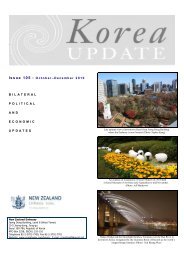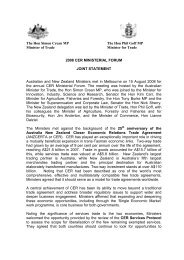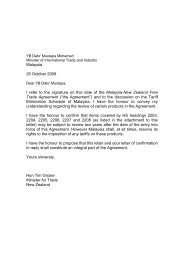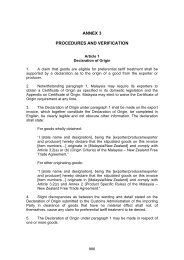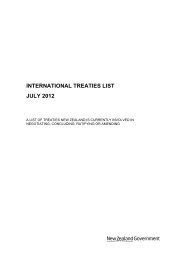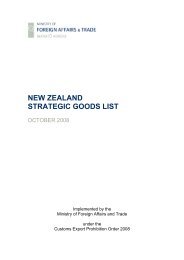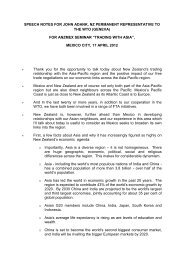New Zealand's National Universal Periodic Review (UPR) Report ...
New Zealand's National Universal Periodic Review (UPR) Report ...
New Zealand's National Universal Periodic Review (UPR) Report ...
- No tags were found...
You also want an ePaper? Increase the reach of your titles
YUMPU automatically turns print PDFs into web optimized ePapers that Google loves.
Jason Pou suggested that a reference needed to be added to 2.4 (InternationalCommitments) on the Kyoto Protocol. He noted that its application within <strong>New</strong> Zealandhad been biased. Specifically it favoured private as opposed to collective property rights.Annette Sykes also queried this section’s reference to international commitments. Shequestioned why for example why certain international obligations were prioritised overothers, noting FTAs as an example. In these agreements international obligations werejudged to be more important than obligations to Maori. The government’s stance on theDRIP seemed in stark contrast – here the majority of the UN had reached an agreementthat <strong>New</strong> Zealand stood away from. Jason Pou suggested that the government’s approachto mining was another example of where the government was discriminating against Maoriunder the cover of “international commitments”. Tony Wihapi echoed the comments thatthe Treaty of Waitangi needed to be prioritised over other international agreements.Areta Koopu noted that 2.6 (Human Rights Legislation) refers to the Human RightsAmendment Act 2001 – this was an important legislative change however the draft reportdoes not refer to the Hui that were held at the time and the significant number of issuesraised during these. Annette Sykes noted that an important omission from this section ofthe report was a reference to the Kyoto Protocol and the CNI settlement. These hadsignificant implications for Maori – an example being that Maori needed to pay a penalty toconvert land from its existing use. This made a lot the land that had been returned toMaori through settlements virtually useless, particularly in the case of forests whereupkeep of the land and the forests required significant costs equivalent at times to 6 timesthe value of the land. This has become a poverty trap. Jason Pou took this point further tonote that in many instances there was a real opportunity to use the land productively in theform of farms or market gardens etc, but this was being restricted.Murray Henare suggested that this section should note the importance of CLCs. Thepotential closure of many of these due to funding issues was a real problem for Maori whoare big users of the service. The important service that CLCs provide would become evenmore so as the financial crisis impacts on <strong>New</strong> Zealand.Section 3 Promotion and Protection of Human RightsNgaire Whata suggested that the characterisation of Maori in the report 3.1 (Treaty ofWaitangi and the Rights of Indigenous People) was incorrect. There is an absence in thedraft report to the process of colonisation of <strong>New</strong> Zealand. The true status of the Treaty ofWaitangi should be stated in the report. <strong>New</strong> Zealand’s position on the DRIP also needs tobe spelt out.Ngaire Whata further questioned what might be the best way to present Maori humanrights issues in the report. The draft report should present the current health situation as itrelates to Maori. Maori health is a significant issue – Whata noted that work was currentlyunderway on a draft Declaration on Indigenous Health as this was such an importantissue.Tony Wihapi also noted issues relating to Maori were not accurately reflected in the draftreport. Wihapi made a comparison with the US and the situation of African Americans –Maori he noted were different, Maori are the indigenous native people of <strong>New</strong> Zealand andthis needed to be brought out more clearly in the report. <strong>New</strong> Zealand’s position on theDRIP was “shocking in the extreme”. In <strong>New</strong> Zealand Maori do not have political power asthey are “ruled by the tyranny of the majority”. This process started in the Bay of Plenty(reference to Bay of Plenty Regional Council Maori Constituency Empowering Act). For31



